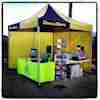DanceSafe: Keeping Our Dancefloors Safe


Anthony Mooney
Charging $6 for a bottle of water, even though it's a scorching hot outdoor event. Removing bottle caps and bathroom attendees scolding those trying to refill their water bottle from the sink. The resources that keep festivalgoers safe have become cash cows for business owners, property owners, and event promoters. And, these owners and promoters can justify their actions by saying that free water promotes drug use. This absurd explanation is due to the RAVE Act: a broadly written law that can hold them accountable for any attendees caught with or were to overdose on drugs.
"In terms of just charging someone under the RAVE Act, nobody's actually been charged or convicted just based on throwing events," says Mitchell Gomez, executive director of DanceSafe, which focuses on health and safety within the scene so people can party responsibly.
"It's always been larger criminal investigations, but what it does is it creates this thing that promoter's attorneys can point [to] where they say, 'Hey, if we promote drug use,' which is not defined in the law, 'we can face these really serious criminal and civil penalties.'"
However, the RAVE Act does more than provide a scapegoat for seedy behavior. It prevents harm reduction and drug education at events.
DanceSafe provides on-site drug testing at events so attendees can ensure their drugs are safe and don't contain even more harmful substances.
The recent spike in fentanyl overdoses due to laced cocaine (MDMA and ketamine also face this issue) is evidence enough for the importance of drug testing. CDC data states that there were 100,306 drug deaths during the 12-month period that ended April 2021.
While Gomez believes the data gets intentionally obfuscated, he says it's clear that the majority of deaths are from fentanyl—with the majority happening in the New York to Philadelphia area. A milligram or two of fentanyl is enough to slow down one's breathing and lead to death.


DanceSafe
Harm reduction and drug testing at festivals can certainly aid in reducing these deaths—even the Los Angeles Times points to 29 rave attendees who passed away due to drug-related causes.
While many people research a drug before taking it, Gomez says, "All the homework in the world doesn't matter if the drug you end up taking isn't the drug you thought you were taking. Your homework is pretty irrelevant." In addition to providing resources at festivals, DanceSafe sells at-home drug testing kits to keep ravers safe even off the dancefloor.
While DanceSafe proves to be a successful program that helps prevent drug overdoses, Gomez believes the ultimate way to combat drug use deaths is to legalize all drugs. He points to Switzerland as an example of a country that provides heroin assist programs and even prescribes heroin to those addicted to it—ultimately eliminating overdoses by those involved in the program.
"I don't know how far away we are from that public conversation in [the United States], but that really, to me, is the only solution," Gomez says.
